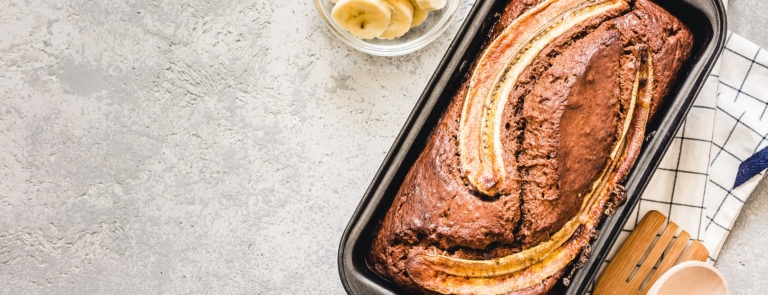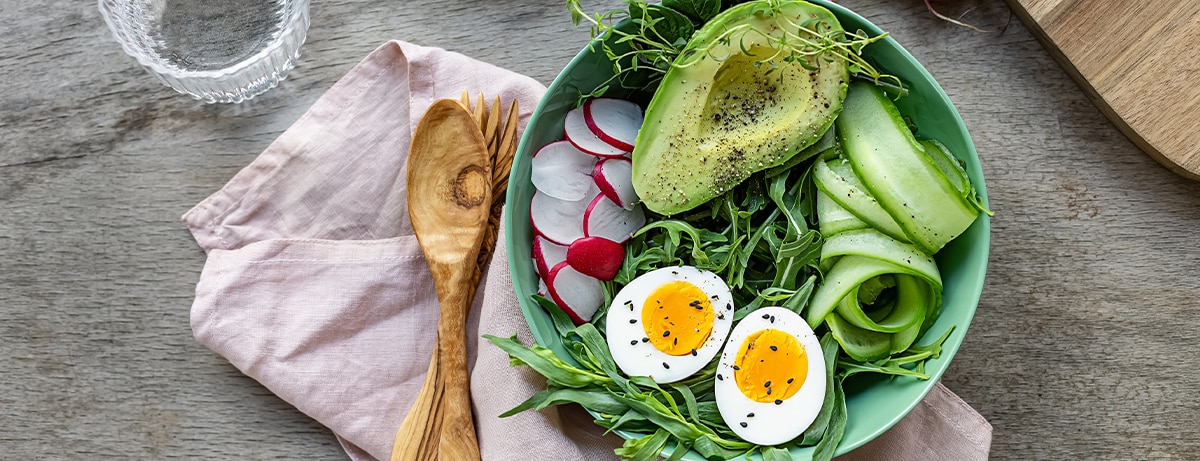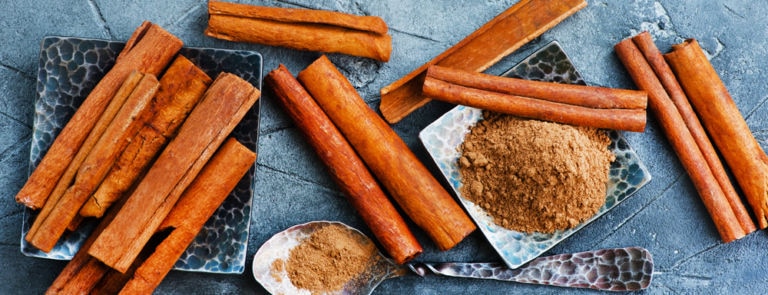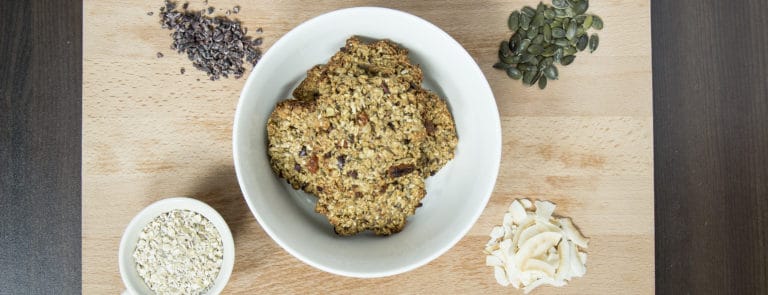10% off £35
Code:SAVE
Benefits of vegan banana bread

Banana bread is one of the easiest vegan cakes to make as bananas make an excellent egg substitute. Here are the main benefits of vegan banana bread.
Banana bread is one of the easiest vegan cakes to make as bananas make an excellent substitute for eggs and help to bind the mixture together.
It is a great way of using up bananas which would otherwise go to waste. Plus it is sweet and comforting, perfect for enjoying with a hot drink during the colder months.
Not only is it delicious but whipping up an easy banana bread is actually good for you!
Mainly down to the bananas, vegan banana bread also contains lots of nutrients, which means there is more to this satisfying snack than meets the eye.
Here are some of the benefits of vegan banana bread:
1. Banana bread is high in antioxidants
Bananas are high in antioxidants which help to support cellular health and reduce harmful free radicals.1 Free radicals are produced when your body breaks down food or when you are exposed to cigarette smoke or radiation. It is thought that free radicals may contribute to heart disease and cancer, amongst other diseases.22. Banana bread is a source of protein
Banana bread can be high in carbohydrates but it can also be a good source of protein. Protein is essential for muscle growth and repair and everyone needs this in their diet.3 You may need more protein if you work out or if you are training for a sporting event. The high protein content helps to satisfy your appetite, keeping you feeling fuller for longer which means that you won’t want to eat the whole loaf…well, you might not anyway! Add walnuts to your simple banana bread recipe for an extra source of vegan protein, as these also contain lots of protein.43. Banana bread is high in potassium
It is well known that bananas are high in potassium and the good news is that they retain their potassium content when baked into a healthy banana bread.5 This mineral helps nerves and muscles to communicate, as well as helping nutrients to move into cells and waste products to move out of cells. Furthermore, it can even help support normal functioning of the heart.64. Banana bread is high in fibre
Again, this is down to those yellow wonders. Bananas are high in fibre which helps you to feel fuller meaning you will be less tempted to reach for more snacks or to overeat at mealtimes. Fibre can also help to support healthy digestion and allows food to move through the digestive tract normally.5. Banana bread is high in magnesium
Bananas are also high in magnesium. Magnesium is involved in a number of processes in the body, including regulating the nervous system and increasing energy.7 Magnesium can also help to improve your performance when you are exercising or taking part in sports.86. Bananas are high in vitamins
Bananas are also high in vitamins A and C which they still retain once they are transformed into a banana loaf. Vitamin A helps to form healthy teeth, bones, soft tissues, mucus membranes and the skin. It also produces the pigment in the retina of the eye and helps to support good eyesight, especially in low light.9 So maybe it is not just carrots that help you to see in the dark after all! Vitamin C is one of the vitamins that helps to keep your healthy as it helps to protect the cells, helps to maintain healthy skin, bones, cartilage and blood vessels.10 Vitamin C is often contained in skincare products too – so if you have any banana left once you have made your banana bread, why not make a banana face mask and relax for half an hour whilst you wait for it to cook?!7. Whole grains are healthier
If you decide to substitute white flour for a whole grain alternative in your vegan banana loaf recipe, you will find lots more nutritional benefit. Whole grain flours retain all layers of the grain, unlike refined flours which have had the bran and germ layers removed. Whole grain flour has lots of vitamins and minerals, including vitamin B6 and magnesium which can help to support the production of energy. Whole grain flour is also a good source of fibre which helps with your digestion.11 Shop Vegan Food & Drink Last Updated: 29th January 2021 Sources 1 https://22daysnutrition.com/blogs/blog/the-best-vegan-banana-bread-recipes 2 https://www.mayoclinic.org/healthy-lifestyle/nutrition-and-healthy-eating/multimedia/antioxidants/sls-20076428 3 https://www.livestrong.com/article/268303-what-are-the-health-benefits-of-banana-bread/ 4 https://www.healthline.com/nutrition/foods/walnuts#vitamins-and-minerals 5 https://22daysnutrition.com/blogs/blog/the-best-vegan-banana-bread-recipes 6 https://www.nhs.uk/conditions/potassium-test/ 7 https://22daysnutrition.com/blogs/blog/the-best-vegan-banana-bread-recipes 8 https://www.ncbi.nlm.nih.gov/pmc/articles/PMC5622706/ 9 https://medlineplus.gov/ency/article/002400.htm 10 https://www.nhs.uk/conditions/vitamins-and-minerals/vitamin-c/ 11 https://www.livestrong.com/article/268303-what-are-the-health-benefits-of-banana-bread/Related Articles
Shop by wellness goal
Sign up for exclusive offers
Plus, get expert advice to support your health & wellness straight to your inbox when you sign up to Holland & Barrett emails.
Read our
privacy policy














